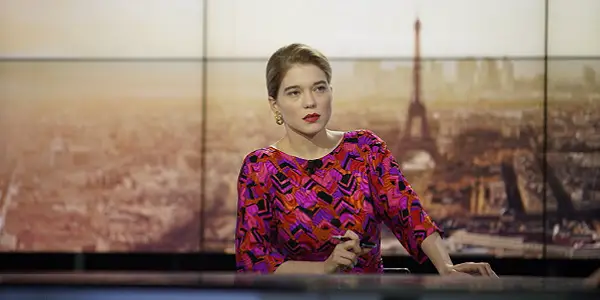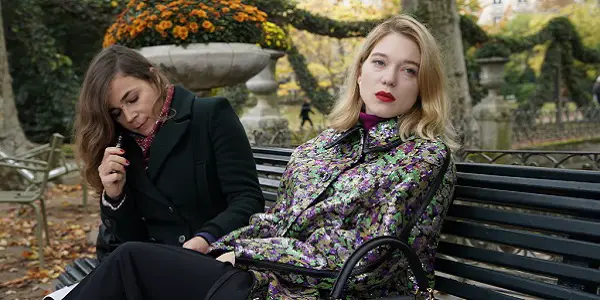FRANCE: Seydoux Shines In Dumont’s Sloppy Satire

Lee Jutton has directed short films starring a killer toaster,…
The title of writer-director Bruno Dumont’s latest film, France, is not just the name of the country in which it is primarily set but also its protagonist, a popular television journalist played by the brilliant Léa Seydoux. A woman who seems to have it all, France de Meurs hosts heated debates on her studio news program, travels to war zones to report on the conflict, and drives her son to and from school, all without even smudging her signature fuchsia lipstick. But a freak accident throws France’s perfectly curated life and career into discord, forcing her to come to terms with the superficiality of her existence. What starts as a sharp satire of contemporary news media gradually starts to buckle under the weight of everything Dumont throws at the screen, but Seydoux’s dynamite performance burns bright enough to outshine the mess piled up around her.
Broadcast News
Everywhere France goes, people stop her on the street to express their admiration and take phone selfies with her. She’s a bonafide superstar, a television journalist seemingly invented by Instagram algorithms. When she travels abroad to interview Tuareg soldiers fighting ISIS, France doesn’t just stick to asking them questions; she also directs the camera, ensuring her reverse shots are captured against the most aesthetically pleasing backdrops possible, and attempts to manipulate the gun-wielding warriors, asking them to do things like walk menacingly towards the camera or raise their guns in the air triumphantly.

Growing frustrated with the soldiers’ inability to understand what she wants, it is clear that France places herself—and the audience’s perception of her — front and center in her reporting, rather than the news itself. (Her fuchsia lipstick even accompanies her into the war zone.) The resulting report, edited to air on her television program, is indeed impactful — but once you’ve seen how the sausage was made, it’s much harder to appreciate how it tastes. This whole sequence, which occurs towards the beginning of the film, perfectly sets up France as a character while also poking fun at her, the industry of which she is a part, and the audience members who are unable to see how manufactured it all is.
One morning, a distracted France accidentally hits a young man named Baptiste (Jawad Zemmar) with her car. The resulting negative media attention is shocking to France, who goes out of her way to repair the damage done to her image by giving thousands of euros to Baptiste’s family as compensation. But the accident is only the beginning of France’s downward spiral, which includes a romantic betrayal by a fellow journalist and an extremely embarrassing on-air mishap. But as her cynical producer, Lou (the deliciously funny Blanche Gardin), reminds her, the news cycle moves at a rapid pace — in only a day or so, France will be able to rise from the ashes and reinvent herself as the hero of her story once again. But in a world with such a short attention span, how can one ever learn from one’s mistakes?
Dressed for the Image
France is a visually stunning film, each frame as meticulously curated as the titular character’s news segments. Seydoux’s bright blonde hair and porcelain skin are utilized to maximum effect, her natural beauty emphasized by a hip jewel-toned wardrobe that manages to simultaneously say “take me seriously” and “aren’t I sexy?” (We’re talking tailored but backless dresses and skirt suits in bold patterns that hug her figure.) When France begins to unravel, she forgoes the bright, look-at-me pinks and oranges of her usual ensembles for more subdued blues and greens; she also gives up that fuchsia lipstick, which is a great signifier of how France is feeling at any given time. (When she reappears wearing it again, you know her comeback is on.)

It’s not just Seydoux and her wardrobe, courtesy of costume designer Alexandra Charles, that look great here. The sets are also meticulously designed, from France’s gigantic, dark apartment, filled with framed artwork and other signifiers of wealth and prestige, to the candy-colored set of her television program, quite possibly the most aggressively feminine and fashionable news studio I have ever seen. Other little details, such as Lou’s incessant vaping and Baptiste’s extravagant purchases with France’s money, fill out this deranged but all too familiar world and the characters who populate it to great effect.
Unfortunately, France’s script is far less impactful than its visuals, seesawing from aggressively heavy-handed to utterly nonsensical from scene to scene. By far the best moments in France are those on location in the war zone, where France shows us exactly how big a narcissist she is by directing her crew to shoot her halves of interviews over and over again and even having someone carry her on their back through shallow water to a boat packed with refugees so she can appear on camera among them. Not only are these scenes bitingly funny, but they also force you to contemplate just how much of what you see on the news every day is as pointedly pieced together as France’s work. (The answer is no doubt all of it.)

But once France ends up in a scenic rest facility straight out of Thomas Mann’s The Magic Mountain, Dumont seems more interested in piling dramatic events on top of dramatic events than in thinking about what they all might mean. These moments might play up France’s unparalleled ability to bounce back from even the most heinous tragedies, but they’re exhausting for audience members that lack her Teflon coating and provide unnecessary distractions from the film’s more powerful moments of satire.
Nonetheless, even in the film’s weakest moments, Seydoux is never less than masterful. She makes France such a cold, carefully-calibrated individual that even when she breaks down in tears (repeatedly, including during her news segments) one assumes that it is all part of the image she has manufactured for herself—an image she values more than anything else in her entire life. It’s a fascinating performance, compelling you to want to see who the real woman is behind the mask, if she even exists at all.
Conclusion
Seydoux‘s performance is almost enough to make one overlook the flaws inherent in France, but not quite.
What do you think? Are you a fan of Léa Seydoux? Share your thoughts in the comments below!
France is released in New York and Los Angeles on December 10, 2021. You can find more international release dates here.
Watch France
Does content like this matter to you?
Become a Member and support film journalism. Unlock access to all of Film Inquiry`s great articles. Join a community of like-minded readers who are passionate about cinema - get access to our private members Network, give back to independent filmmakers, and more.
Lee Jutton has directed short films starring a killer toaster, a killer Christmas tree, and a not-killer leopard. Her writing has appeared in publications such as Film School Rejects, Bitch: A Feminist Response to Pop Culture, Bitch Flicks, TV Fanatic, and Just Press Play. When not watching, making, or writing about films, she can usually be found on Twitter obsessing over soccer, BTS, and her cat.












